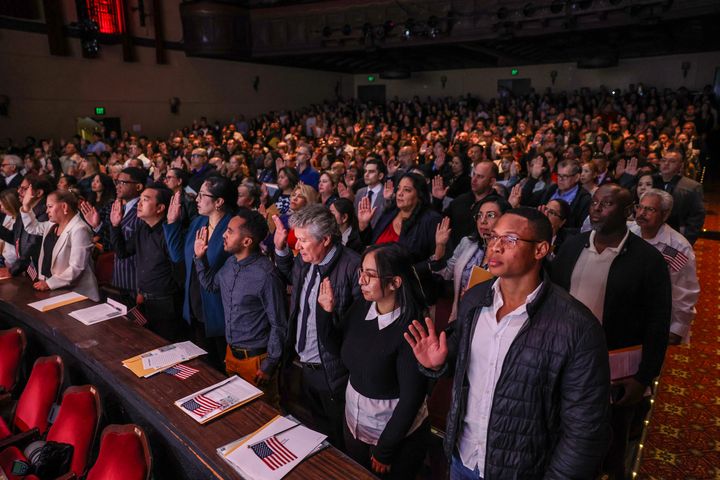The Department of Justice sued Alabama on Sept. 27 for improperly removing from the voter rolls more than 3,200 people the state claims are noncitizens, an expulsion that falls within the 90-day preelection “Quiet Period’ where states are forbidden from purging voter rolls.
Alabama Secretary of State Wes Allen announced a purge of 3,251 alleged “noncitizens” from the state’s voter rolls on Aug. 13. The National Voter Registration Act makes it illegal for states to purge voter rolls within 90 days of an election, a period which began on Aug. 7.
“The Quiet Period Provision of federal law exists to prevent eligible voters from being removed from the rolls as a result of last-minute, error-prone efforts,” Kristen Clarke, the assistant attorney for the Civil Rights Division, said in a statement announcing the lawsuit. “The Justice Department will continue to use all the tools it has available to ensure that the voting rights of every eligible voter are protected.”
In a statement on the lawsuit, Allen said, “I was elected Secretary of State by the people of Alabama, and it is my Constitutional duty to ensure that only American citizens vote in our elections.”
Allen’s voter purge came as part of a concerted effort by the Republican Party to falsely claim that noncitizens are illegally voting en masse in federal elections. Former president and current presidential candidate Donald Trump, along with Speaker Mike Johnson and numerous state officials, have stated falsely that noncitizen voting is widespread, apparently in a preemptive move to excuse a potential Trump election loss.
Noncitizen voting, however, is already both illegal and exceedingly rare. A study by the progressive Brennan Center for Justice found just 30 cases of suspected noncitizen voting were referred for investigation across 12 states in the 2016 election. Those cases did not necessarily even involve a noncitizen. Trump’s own election fraud task force was disbanded after it failed to find any evidence of widespread election fraud.

What these supposed noncitizen voter purges do, however, is kick actual U.S. citizens from the voter rolls. In Alabama, Allen’s purge of supposed noncitizens swept up hundreds, if not thousands, of actual U.S. citizens. Over 700 Alabamans who were removed have already re-registered to vote, according to the DOJ lawsuit, showing that these purged voters were citizens all along. Many of the other purged voters could also be citizens who either did not receive letters warning them of the suspension of their registration, or who have not been able to re-register yet.
“I think the fact that naturalized citizens and U.S.-born citizens have been swept up in the purge in Alabama indicates how likely these efforts are to sweep up U.S. citizens and deprive them of their right to vote,” said Kate Huddleston, a lawyer with the Campaign Legal Center, a voting rights nonprofit representing clients in a separate lawsuit against Allen’s voter purge.
That lawsuit, brought by Alabama citizens along with local nonprofits including Alabama Coalition for Immigrant Justice and the Alabama State Conference of the NAACP, included affidavits detailing the experiences of those improperly purged.
Jose Sampen, a naturalized citizen from Peru who works for FedEx, testified that his registration was purged from the rolls despite having become a U.S. citizen in 2023. When he went to re-register, election workers made him show his passport, despite Allen’s letter stating that he would only need a driver’s license as identification.
“The whole experience made me feel like I was being subjected to a citizenship test that no U.S.-born citizen would have to undergo, just so I could exercise my right to vote,” Sampen wrote.
James Cozadd, a resident in Deatsville, Alabama, and a registered Republican, had his registration purged by Allen even though he was born in Alabama and was at no previous point a noncitizen.

“I was stunned to receive that letter. It feels like they are trying to make me think I’ve broken the law—just for trying to exercise my right to vote,” Cozadd said in the affidavit. “While I hope it was just a mistake, I think if they were just trying to verify something, they would have done so long before the election.”
This is not uncommon for purges of supposed noncitizens. The database matching that secretaries of state use to find noncitizens are faulty, and routinely sweep up naturalized citizens who at one point in time registered as noncitizens in a federal or state database and have since become citizens.
U.S.-born and naturalized citizens have similarly been swept up in highly publicized purges of “noncitizen” voters in Ohio and Texas, in recent years. Similarly, Virginia officials were rebuked in 2023 after erroneously removing more than 3,000 voters they incorrectly claimed were illegally registered felons.
Another affidavit filed in the Alabama case by James Stroop, a 55-year old resident of Union Grove, Alabama, shows how faulty database matching aimed at identifying noncitizens routinely sweeps up and targets U.S. citizens.
Stroop, who was born a U.S. citizen in Florida, had at one point filed for unemployment benefits and, in doing so, accidentally checked the box identifying himself as a noncitizen. He later cleared this up with the Alabama Department of Labor by providing his birth certificate, but the accidentally checked box remained in the agency’s database. This faulty data was used by Allen to claim, incorrectly, that Stroop is a noncitizen who illegally registered to vote.
Not only were these voters incorrectly identified as noncitizens and purged from the voter rolls, but Allen also referred all of them for criminal investigation by the state attorney general.
Stroop noted his concerns that this criminal referral could come up in a future job interview and force him to hire a lawyer.
“I cannot believe Secretary Allen can use wrong information to harm me like this,” Stroop said in his affidavit, “including by un-registering me as a voter and placing me under criminal investigation, and will not even apologize when it turns out he was completely wrong.”
Disclaimer: The copyright of this article belongs to the original author. Reposting this article is solely for the purpose of information dissemination and does not constitute any investment advice. If there is any infringement, please contact us immediately. We will make corrections or deletions as necessary. Thank you.
